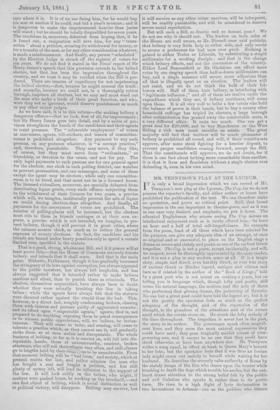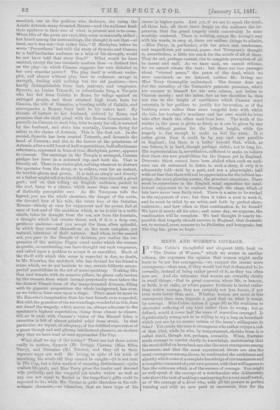MR. TENNYSON'S PLAY AT THE LYCEUM.
IT is only a broad impression which we can record of Mr. Tennyson's new play at the Lyceum, The Cup, for we do not possess the reporter's faculty, and either author or lessee have prohibited the publication of the text. We can therefore make no quotation, and prove no critical point. Still, that broad impression is the one important to theatre-goers, and as it was in our case very distinct and emphatic, we put it down. The educated Englishman who misses seeing The Cup misses an intellectual enjoyment such as is rarely offered him,—he loses an hour and a hiilf of total self-forgetfulness. No excerpta from the poem, least of all those which have been selected for the purpose, can give any adequate idea of an attempt, at once so original and so successful, to place on the English stage a drama as severe and stately and poetic as one of the earliest Greek tragedies. The Cup is not a poem, except incidentally, and will, we suspect, never be thoroughly appreciated by the mere reader, and it is not a play in any modern sense at all. It is a tragic story, simple and direct, even harshly direct, as ever was story of ancient Greek or Hindoo legend, antique and solemn and bare as if related by the author of the " Book of Kings ;" told by a great poet who is not intent on making a poem, but on telling you in language which, though lofty and poetic, still seems his natural language, the motives and the acts of those who performed that gloomy drama, the poisoning of Synorix. No one but a great poet could have told the legend so ; but it is not the poetry the spectator feels so much as the perfect adequacy of the thought, and of the expression of the thought, to the grandeur of the situations and of the scenes amid which the events move on. He wants the lofty melody of the lines throughout. The tragedian is never lost in the poet, the story in its author. The personages speak often magnifi- cent Hues, and they seem the most natural expressions they could have used; they pose tragically amidst scenes of over- powering awe, and it occurs to no one that they could have stood otherwise, or have been anywhere else. Mr. Tennyson writes a song equal, in effect at least, to Queen Mary's lament to her lute; but the spectator feels that it was thus an Ionian lady might croon out melody to herself while waiting for her husband. He describes the serenely calm authority of Rome by the stately image of the lion who stares upon the hunter while brushing to death the dogs which trouble his melee, but the out- burst draws attention to the strong belief felt by the politic and evil Galati= who speaks it, rather than to its poetic form, He rises to a high flight of lyric declamation in two invocations to Artemis--one as the goddess who blesses mankind, one as the goddess who destroys, she being the Asiatic Artemis, many-breasted. Nature—and the audience hush their applause in their awe of what is present and is t come. When bits of the poem are read, they seem occasionally stilted, ; but hoard among the surroundings, the thought is not that—at least, our's was not—but rather this, " If JEschylus, before he wrote Prometheus' had told the story of Synorix and Camma to a half-barbarian audience as a trial of his strength, would he not have told that story thus?" What would he have omitted, except the two intensely modern lines—a distinct blot on the play—in which Comma suggests her own disbelief in her own oracular power ? The play itself is without under- plot, and almost without plot, bare to rudeness, savage in strength, dealing with nothing but the old passions,—love' hardly distinguishable from lust, jealousy, and vengeance. Synorix, an Ionian Tetrarch, or subordinate king, a Tarquin who has fled from Galatia to Rome for refuge against an outraged people, and there attained high trust, lusts for Camma, the wife of Sinnatus, a hunting noble of Galatia, and accompanies a Roman force back to his native land. By threats of torture to her husband, ordered. by Rome, and promises that she shall plead with the Roman Commander, he prevails on Comma to meet him, tries to carry her off, is arrested by the husband, and stabs him mortally, Camma flying for safety to the shrine of Artemis. This is the • first act. In the second, Synorix has been created Tetrarch, and demands the hand. of Camma; and she, to the horror of the priestesses of Artemis, after a wild burst of half-superstitious, half-affectionate reluctance, expressed. in lines of true dEschyleatt power, appears to consent. The marriage in the Temple is arranged, Camma pledges her lover in a poisoned cup, and both die. That is literally all. There is no under-plot, nothing whatever to distract the spectator from the story, or to relieve, even for an instant, its terrible gloom and power. It is told as simply and directly as a father might tell it to his children, if he were himself a great poet ; and ou that telling an English audience, packed. to the roof, hang in a silence, which more than once was one of distinctly perceptible awe. As Mr. Tennyson tolls the legend, you see the whole situation, the danger of the noble, the devoted love of his wife, the brute love of the Galatian Roman—thirsty at once for enjoyment and for power, full at once of lust and of the ambition which, as he is told in a noble simile, takes its draught from the sea, not from the fountain, a draught which but creates thirst, and, if it is a deep one, produces madness—and. you accept the lines, often splendid, in which they reveal themselves, as the most complete, yet natural, utterance of their natures. And when, in the second act, you pass to the Temple of Artemis, you realise the im- pression of the antique Pagan creed under which the woman so gentle, so unrelenting, can have thought out such vengeance, and called upon a goddess to accept it as sanctified. Much of the thrill with which this scene is regarded is due, no doubt, to Mr. Knowles, the architect, who has devised for his friend a scene which, we do not hesitate to say, reveals hitherto unsus- pected. possibilities in the art of scene-painting. Nothing like that vast temple, with its massive pillars, its gloom only broken by the cressets from which incense perpetually rises before the far-distant Titanic form of the many-breasted Artemis, filling with its gigantic proportions the whole background, has ever, as we believe, been seen upon a stage. There must be more in Mr. Knowles's imagination than his best friends ever suspected. But still, the grandeur of the surroundings, wonderful as it is, does not dwarf the tragedy, which moves on, always adequate to the spectator's highest expectation, rising from climax to climax, till, as it ends with Gamma's vision of the Blessed Isles, a sensation is felt of almost painful relief from strain. In that particular, we repeat, of adequacy, of the fulfilled. expectation of a great though sad and gloomy intellectual pleasure, no modern play that we have read or seen approaches The Cup.
What shall we say of the acting ? There are but three actors really in motion, Synorix (Mr. Irving), Camma (Miss Ellen Terry), and Sinnatus (Mr. Terriss), and they all in their separate ways act well. Mr. Irving, in spite of his trick of mouthing his words till they cannot be caught—(it is not rant in The Cup, but a false method of ensuring distinctness)—quite realises his part; and Miss Terry gives the tender and devoted wife perfectly, and the vengeful yet tender widow as well as any one not equal to Rachel in the tragedian's gifts could. be expected to do ; while Mr. Terriss is quite blameless in his sub- ordinate character,—so blameless, that we have hope of his career in higher parts. And yet, if we are to speak the truth, all three fail; all three leave deeply on the audience the im- pression that the grand. tragedy could conceivably be more worthily rendered. There is nothing, except Mr. Irving's way with his words, to carp at, there are endless things to admire, —Miss Terry, in particular, with her grace and tenderness, and magnificent, yet natural, poses—but Tennyson's thought is, nevertheless, a little too much for the minds of all of them. They do not, perhaps cannot, rise to complete perception of all he meant and said. As we have said., we cannot criticise, for we cannot obtain the text ; but there are two paasages • about "eternal peace," the peace of the dead, which we were convinced, as we listened, neither Mr. Irving nor Miss Terry thoroughly understood. The former does not feel the unreality of the Tetrarch's patriotic promises, which are excuses to himself for his own crimes, not bribes to Camma merely ; and the latter, fine as her elocution is, does not rise to the height of confidence which Camma must entertain in her goddess to justify her invocation, or of the loathing scorn rather than mere vengeful hate with which she bids her husband's murderer and her own would-be lover take after death the other road from hers. The truth of the matter is, the poem is given as finely as it can be given by any actors without genius for the loftiest height, while the tragedy is fine enough to make us feel the want. It is better given than it could be by any cast now possible in England; but there is a better beyond. that, which, as one listens, it is hard, though perhaps unfair, not to long for. The representation is, nevertheless, sufficient to make us believe that there, are new possibilities for the Drama yet in England. Dramatic thirst cannot have been slaked when such an audi- ence can sit entranced to listen to such a story, if only it is adequately told—told. by a poet, and not a playwright; told without fear that there will not be appreciation for the loftiest lan- guage, the most glOwing poetry, the grandest situations. There must be somewhere in the English mind capacities for intel- lectual enjoyment to be realised. through the stage, which of late have never been fairly tried. There is a mine to be worked in the enjoyment of awe ; but then it takes a poet to work it, and he must be aided by an artist, and both by perfect elocu- cutionists ; and how often is that combination to be found ? We have it nearly all for once ; and some day, we suppose, the combination will bo complete. We had thought it nearly im- possible that tragedy should survive in England, that dramatic art, to succeed, must consent to he Philistine and bourgeois ; but The Cup has given us hope.



































 Previous page
Previous page